
10 ways to help students become “future ready”
This makes an excellent refection activity to see if you are helping students become future ready.

10 ways to help students become “future ready”
This makes an excellent refection activity to see if you are helping students become future ready.
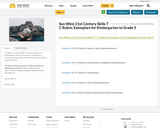
Sun West 21st Century Skills 7 C Rubric Exemplars for Kindergarten to Grade 5 for character, collaboration, creativity, communication, critical thinking , computer and digital technologies, and cultural and ethical citizenship.
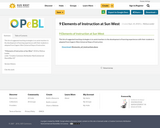
This list of suggested teaching strategies is to assist teachers in the development of learning experiences with their students is adapted from Gagne’s Nine Universal Steps of Instruction.

This article examines the steps required to involve students in their assessment. This article aligns closely with the PeBL philosophy and involves students throughout the learning process.
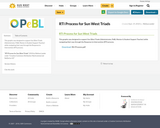
This graphic was designed to support Sun West Triads (Administrator, PeBL Mentor & Student Support Teacher) while navigating their way through the Response to Intervention (RTI) process.
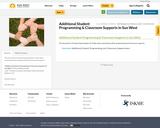
This document is the planning template for Triads when examining student programming and classroom supports.
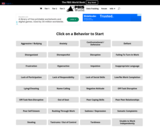
Select the student behaviour to begin. Then you will work through a series of descriptions and suggestions for what you can do to help that student.
You can look at interventions for Tier 1, Tier 2, Tier 3.
Each intervention suggested for a behaviour is then "clickable" and more information is provided on why to use this intervention, and how to do it.
This site is amazing!

A short article about why it is so important to involve students in the planning of learning.
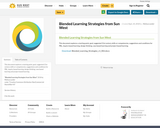
This document explores a starting point, goal, suggested 21st century skills or competencies, suggestions and conditions for PBL, inquiry based learning, design thinking, case based learning and project based learning.

Starting off the year strong by building relationships and trust with parents through an early welcome. This video was created by Jessica Wall and Pam Sawatzky for the 2021-22 Sun West iLearn sessions.A strategy guide for educators is also included.
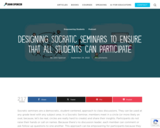
Socratic seminars are a democratic, student-centered, approach to class discussions. They can be used at any grade level with any subject area. In a Socratic Seminar, members meet in a circle and share their insights. Participants do not raise their hands or call on names. Because there’s no discussion leader, each member can comment or ask follow-up questions to one another. This approach can be empowering for participants because they own the conversation. Unlike a typical class discussion, the conversation moves fluidly back and forth rather than having to go through the teacher.
This article outlines several approaches to conducting a Socratic Seminar:
- The Giant Circle Approach
- The “Fish Bowl” Approach
- The Round Table Approach
- The Scattered Approach
- Multiple Seminars
- Online/Offline Seminars
The author also provides a sample of how to run a Socratic Seminar and tips for ensuring that all students can participate.
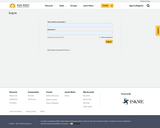
The following is a presentation and supporting materials that can be used with a staff to discuss co-teaching implementation. This presentation was originally used with School Based Administrators at Sun West. If you have any questions or require more information contact Melissa, Carole or Kelli.

Explore how coaches and mentors are different.

Toolkits are available for:
*Lifelong Learning: A Social & Emotional Learning Toolkit for Educators
*Beyond Fake News: A News & Media Literacy Toolkit for Educators
*Teachers' Essential Guide to Cyberbullying Prevention
*Common Sense on E-rate and CIPA: A Toolkit for Schools and Districts
*Girls, Boys, and Media: A Gender and Digital Life Toolkit
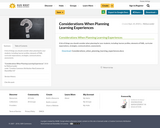
A list of things you should consider when planning for your students, including: learner profiles, elements of PeBL, curricular expectations, strategies, communications, assessments.
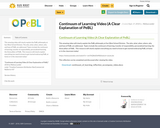
This amazing video will clearly explain the PeBL philosophy at Sun West School Division. The who, what, when, where, why and how of PeBL are addressed. Topics include the continuum of learning, transfer of responsibility, personalized learning, the three pillars of PeBL. This resource will clearly explain everything you need to know to get started embracing PeBL at home or in the classroom today!
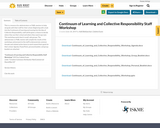
This is a resource for adminstrators or PeBL mentors to help set goals with their staff for their school. Beginning with a look into the Continuum of Learning and moving into the idea of Collective Responsibility, staff will be given a chance to decide where they see their school and where they want to go next. This workshop works best in small, safe groups. The adminstrator or PeBL mentor will compile the results of the workshops and present to the staff to demonstrate common threads and related action items to work toward their goals for their school.
Agenda, PowerPoint, personal booklet, and group booklet are attached.
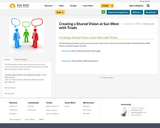
The following presentation and resource was used to help create a shared vision with Sun West Triads (Administor, PeBL Mentor & Student Support Teacher).
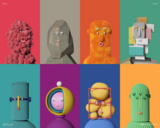
Click "Take the test" in the bottom left corner to get started.
A short and quirky personality style test created by Adobe to showcase varieties of creativity.
The quiz will outline your creative strengths, untapped potential and your ideal way of contributing. For example "The Artist" has the strength of being able to bring ideas and concepts to life; but untapped is fearlessness in expression and this person make a good producer.
Types are the artist, thinker, adventurer, maker, producer, dreamer, innovator, and visionary. Each type includes a goofy animated character that represents the type, there is a description of each type, and who they work best with.
This would be a great addition to a learner profile, or to explore when examining creativity. We can all be creative - just in different ways. This is a great way to illustrate that and spark some rich discussion in your classroom!

This resource examines what deeper learning can actually look like in a classroom. Helpful diagrams of what you will see in a classroom along the way are included.
INTRODUCTION
INSIDE THE CLASSROOM
• Applying Content Knowledge
• Working Collaboratively
• Communicating Clearly
• Thinking Critically 1
• Developing an Academic Mindset
• Learning Independently
GLOSSARY
ADDITIONAL RESOURCES